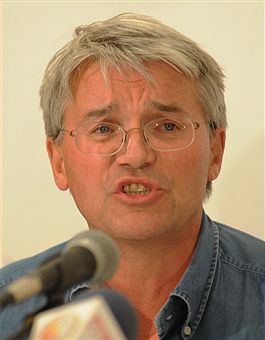 It was a classic gaffe. Andrew Mitchell’s briefing notes have been photographed
outside Downing Street and, according to Sky, they say that the government “welcomes the fact that Hamid
Karzai is leaving office” in Afghanistan.
It was a classic gaffe. Andrew Mitchell’s briefing notes have been photographed
outside Downing Street and, according to Sky, they say that the government “welcomes the fact that Hamid
Karzai is leaving office” in Afghanistan.
This is not altogether surprising. Karzai has already indicated that he will not seek a third term and is expected to stand down in 2014. While the usually fraught relations between NATO and Karzai have been deteriorated further as his administration continues in its corrupt ways. But Mitchell’s slip will probably intensify the speculation that the Western allies are already preparing for the post-Karzai and post-NATO era by talking to, among others, the Taliban. At the moment, though, there seems to be little beyond discussions about the possibility of talks.
NATO is more open about the Libyan campaign. Spokesmen have been speaking today of the rebels’ imminent attack on Gaddafi’s “last bastion” in Sirte. Meanwhile, the rebels have given pro-Gaddafi forces until Saturday to surrender and then the final assault will begin.
Perhaps Gaddafi appreciates the hopelessness of his position, which is why members of his family have fled to Algeria. The Algerians say they have granted sanctuary and will not deport the Gaddafis, especially as one of the party appears to have given birth. This apparently noble sentiment shouldn’t blind observers to the despotic Algerian regime’s opposition to the Libyan intervention and to popular uprisings in general. Algeria has now closed part of its border with Libya, which could be seen as an aggressive move against the emerging regime in Tripoli. That was certainly the way the NTC saw it, calling it an “act of aggression“. It’s a reminder that the already delicate relations in the Maghreb have been further complicated by the Arab Spring.
The British government insists that this is none of NATO’s business, saying that it is for the NTC to pursue the Gaddafi family. The NTC is adamant that the Gaddafis should be extradited; it also suggests that there should be no international peacekeepers in Libya. The NTC’s rhetoric (on the war, the Lockerbie bomber and so forth) has become increasingly assertive in recent days. It now speaks with the assurance of sovereign authority, or is trying to affect that any rate. And it is taking executive decisions: Channel 4 reveals that the Tripolian authorities have encouraged the British police to open a probe into the Yvonne Fletcher case.






Comments